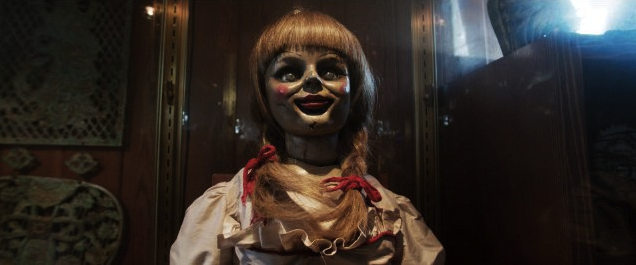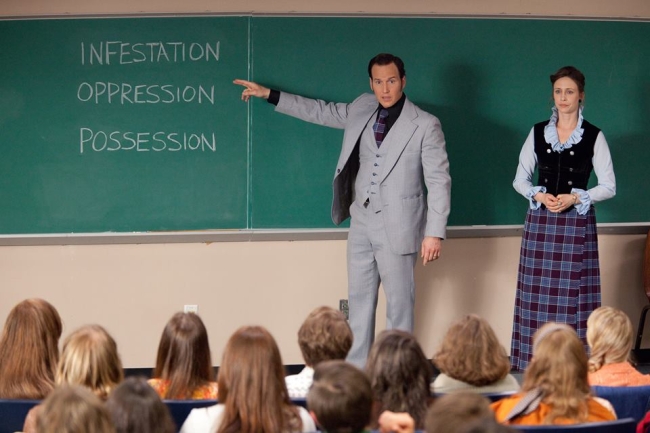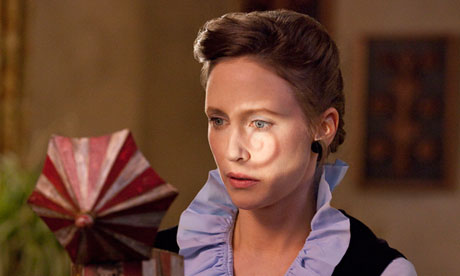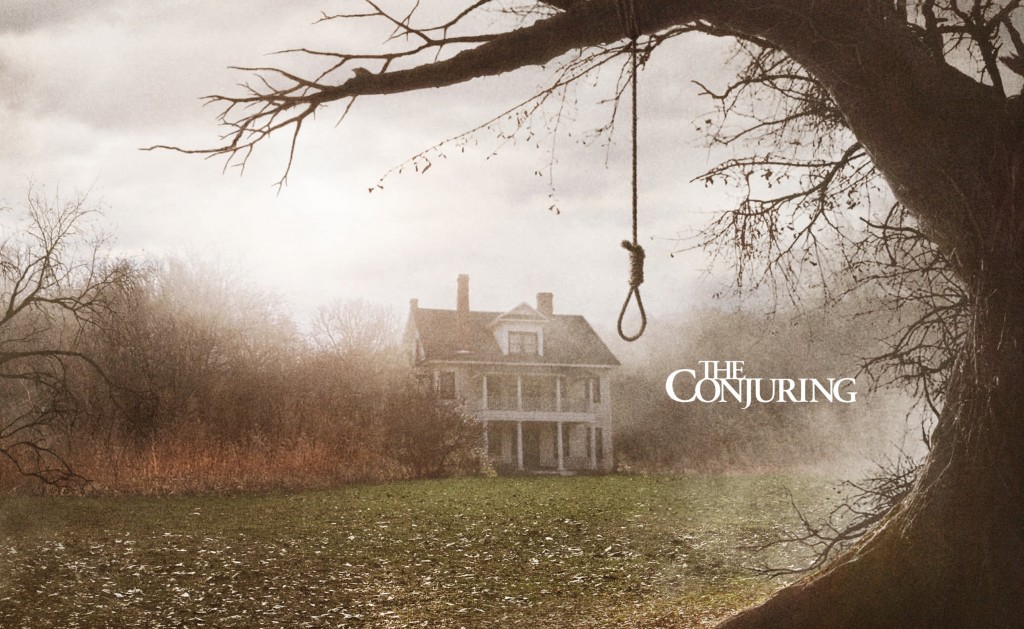Miss me? A review of THE CONJURING
They had me at the doll.
The opening vignette about Annabelle plays like a campfire tale – and could be a scary short film in its own right – as we’re ushered into the allegedly real-life world of Ed and Lorraine Warren. (Sorry Chucky, but this is the scariest doll since Talking Tina from the Twilight Zone.) Since my wife Kat finds ventriloquist dummies and talking dolls the most terrifying horror trope, my hand was gripped tightly from the outset of The Conjuring, an outstanding entry in the horror genre with a surprisingly overt message.
“The devil does exist. God indeed exists. And for us, as people, our very destiny hinges upon which one we elect to follow.” – Ed Warren
I was visibly taken aback when these words came up on the screen, an unerring declaration that one doesn’t expect to see in any major theatrical release, let alone a horror film. If I needed an exclamation point for my enjoyment of the film, or some icing on the movie’s scary cake, this took it. Add to that the fact that this period piece set in the 70s is based on accounts of actual events – with Hollywood flourish and tweaks – and you have an undeniable conversation after the credits roll. The Conjuring may be the most satisfying horror film since The Exorcist, and the most chilling experience I’ve had since The Ring and Paranormal Activity. Whereas this year’s promising Mama delivered scares completely fell apart in act three, James Wan’s film succeeds on three levels:
-
It’s truly scary. From start to finish.
-
It’s well-crafted: directing, cinematography, acting, use of camera and careful employment of special effects… these elements are not typically this refined and Wan’s effort raises the bar.
-
It’s message is surprising and clear.
(Additionally, Patrick Wilson’s sideburns are pretty scary too.)
Some Christians and religious types write off these movies as evil and harmful. I completely disagree, but even I’ve slipped in the past and referred to them as a necessary evil. Like those “scared straight” videos and accident videos one sees in Driver’s Ed, movies like The Exorcist and even Event Horizon have actually produced conversations and situations that led to Christ, and conversion. But calling them “necessary evil” misses the point. The movies aren’t evil, or necessary evil: they are narrative examples of evil.
The notion in some circles of Christendom, that there are demons lurking in the celluloid (or perhaps embedded in the blu-ray?) also misses the point. If demons were lurking around this film, it would be to protest, holding up signs that say stay away, don’t think about these possibilities, don’t think about a reality where we exist, or the extended implications of that spiritual realm. Just keep sucking down your stories about the here and now, the everyday, the ones that don’t consider the hereafter, or the forces (good and bad) behind the veil.
I’ve talked about horror, gore and the Christian here at Cinemagogue before. The worst thing those who believe in the God of the Bible could do is show their fear of a movie, particularly when the book they hold as truth proclaims the perfect love of God casts out fear. The same assurances that the Warrens lean on in the film – the reality of Christ, the power of Jesus, God’s authority over demons – should be more than enough to steady a professing Christian against not even the real thing, but a mere depiction of these possibilities. What does it say about one’s trust in God when a person can’t even bear up under an illustration of evil?
To be fair, I get the “no thanks” response to some degree. Some people like roller coasters. Some people go shark diving. Others do role-playing games. A lot of people don’t bother. One can always say they don’t need to spend the time with an illusion of danger, crafted moments of adrenaline, or an engineered moment of being startled. Some folks I know, love and respect opt out of horror movies because they derive no personal joy from it and they already firmly believe in the Warren statement above. They don’t need these things reinforced. On a personal engagement level, I get it.
However, the group experience – to engage a gripping film that grapples with the supernatural and then discuss it’s possibility, reality, and how we overcome… sounds like one of the reasons we’re called to be in the world. In the film, Ed Warren asks the father of the Perron family – who are being oppressed – if they’ve been baptized. Roger Perron replies that they aren’t really the churchgoing type, and Warren responds simply: “You might want to rethink that.” Exactly.
(As an aside, I really had a hard time not looking at Ron Livingston and NOT thinking of Office Space. “Corporate Accounts, Nina speaking… JUST a moment.” Now THAT’s scary.)
Does the film get everything in line with a Christian worldview? No. However, it seems to skew more in the direction of God’s power and authority than the actual events. For example, an exorcism in the film – in which Ed clearly acknowledges all power comes from God, through Jesus, in English and Latin – replaces a real-life documented account wherein the Warren’s held a seance. I’m not sure what the Warrens were thinking, but the movie’s account seems to make them more biblically faithful than they really were. Usually Hollywood retreats from more overt Christian elements, so its surprising to see a screenplay greenlit with a more Christianized account than the real deal.
One reviewer complains that if the film preaches, it’s the equivalent of a fire and brimstone sermon. I don’t disagree, provided one expects a movie to do ALL the work for them. As I discuss in the Cinemagogue book, stories should be provocation, not proclamation. They are conversation brokers, not brokering the gospel itself. If a story brings the fire and brimstone, it’s the perfect opportunity for the Christian in the midst of moviegoers to explain grace. It’s the lazy Christian who wants a movie to make the point perfectly. Even Jesus explained his parables: the story alone didn’t bring the point home.
People are always worried movies like The Conjuring are going to “open a door” to something… and I guess I’m kind of hoping it does. Scary similarities to spiritual oppression that’s all too real can open a door to conversation about the hope Christians have.






As a person who is really not that into horror movies, these sorts of posts and the case you make for them in the book lead me to re-thinking my engagement of these films. Still not my thing, but I am now starting to see their very useful place in Film & Theology sort of settings.
Found this to be an interesting interview! My wife and I saw the movie after I read your positive review. We’ve had a lot of great discussion the last couple days. Thanks for your work here on the site.
http://www.christianpost.com/news/demonologist-lorraine-warren-discusses-new-movie-the-conjuring-exorcism-and-faith-100225/